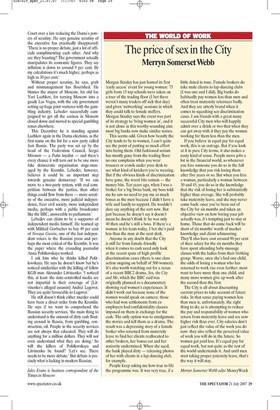The price of sex in the City
Merryn Somerset Webb Morgan Stanley has just hosted its first 'early access' event for young women: 75 girls from 15 top schools were taken on a tour of the trading floor (I bet there weren't many traders off sick that day) and given 'networking' sessions in which they could talk to female staffers. Morgan Stanley says the event was part of its strategy to 'bring women in', and it is not alone in this worthy-sounding aim: most big banks now make similar noises.
This seems odd. Given how beastly the City tends to be to women, I can't quite see the point of putting so much effort into hiring them. Old-fashioned sexism has mostly gone from the trading floor: no one complains when you wear trousers or crawls under your desk to see what kind of knickers you're wearing. But if the obvious kinds of discrimination have gone, the worst bits remain — the money bits. Ten years ago, when I was a broker for a big Swiss bank, my boss told me he saw no need to pay me as much bonus as the men because I didn't have a wife and family to support. He wouldn't dare say anything of the sort now. But just because he doesn't say it doesn't mean he doesn't think it: he was only 40 then and he's still a boss. If there's a woman in his team today, I bet she's paid less than the man at the next desk.
Anyone in any doubt that the City is still far from female-friendly when it comes to cash need only look at the recent spate of high-profile discrimination cases (there is one class action ongoing on behalf of 500 women). It's also worth watching out for a rerun of a recent BBC2 drama, Sex, the City and Me, which the BBC said was originally planned as a documentary showing real women's experiences. It didn't work out because none of the women would speak on camera: those who had won settlements from exemployers had confidentiality clauses imposed on them in exchange for the cash. The only option was to amalgamate the stories and tell them as a drama. The result was a depressing story of a female broker who returned from maternity leave to find her clients reallocated to other brokers, her bonus cut and her seniority undermined. When she sued, the bank played dirty — releasing photos of her with clients in a lap-dancing club, for example.
People keep asking me how true to life the programme was. It was very true, if a little dated in tone. Female brokers do take male clients to lap-dancing clubs (I was one and I did). Big banks do habitually pay women less than men and often treat maternity returnees badly. And they are utterly brutal when it comes to squashing sex-discrimination cases. I am friends with a great many successful City men who will happily admit over a drink or two that when they can get away with it they pay the women working for them less than the men.
If you believe in equal pay for equal work, this is an outrage. But if you look at it in pure City terms, it also makes a nasty kind of sense. People move jobs a lot in the financial world, so whenever you hire someone you do so in the full knowledge that you risk losing them after five years or so. But when you hire a woman, particularly a woman between 30 and 45, you do so in the knowledge that the risk of losing her is substantially higher than average. She will probably take maternity leave, and she may never come back: once you've been out of the City for six months and taken an objective view on how boring your job actually was, it's tempting just to stay at home. Those that do come back will be short of six months' worth of market knowledge and client schmoozing. They'll also have cost around 90 per cent of their salary for the six months they have spent attending baby-massage classes with the ladies from their birthing group. Worse, once she's had one child, the odds of losing a woman who has returned to work rise even further: most want to have more than one child, and many more women give up work after the second than the first.
The City is all about discounting current prices to take account of future risks. In that sense paying women less than men is, unfortunately, the right thing to do; as is attempting to reduce the pay and responsibility of women who return from maternity leave and are now higher risk than ever. City salaries don't just reflect the value of the work you do now: they also reflect the perceived value of work you will do in the future. So women get paid less. It's equal pay for equal work, but not quite as the rest of the world understands it. And until men start taking proper paternity leave, that's the way it will stay.
Merlyn Somerset Webb edits MoneyWeek












































 Previous page
Previous page